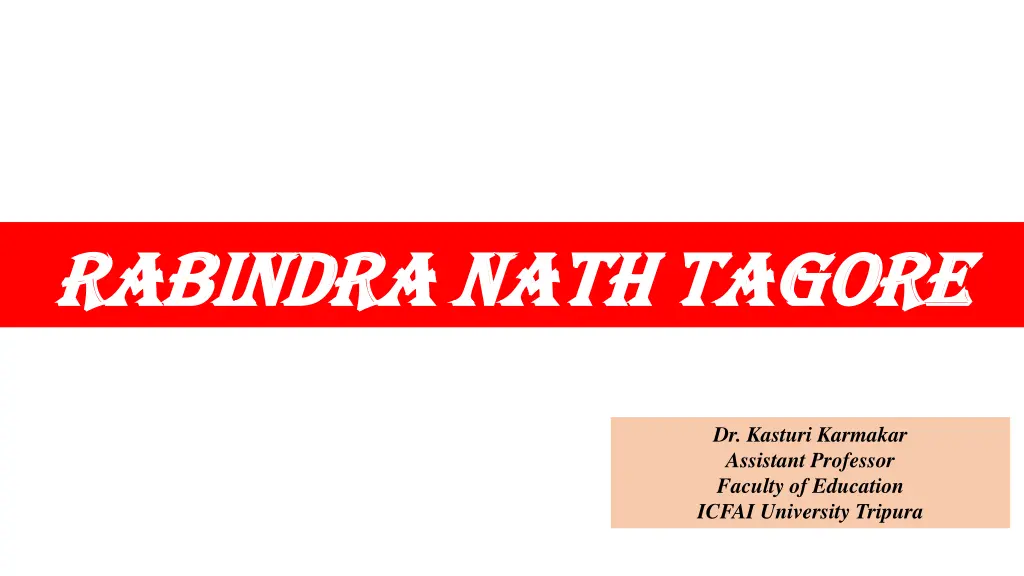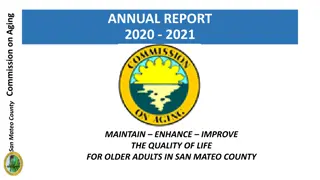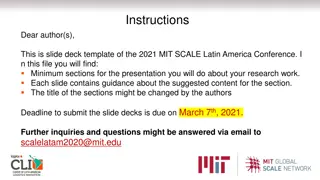
Philosophy and Aims of Education by Rabindranath Tagore
Explore the profound philosophy and educational aims of Rabindranath Tagore, focusing on individualism, idealism, naturalism, Vedanta, humanism, and spiritualism. Understand the factors influencing Tagore's philosophy of education and the moral, spiritual, international brotherhood, and intellectual development aims. Discover Tagore's vision for education to foster inner growth, unity among cultures, and intellectual independence for all-round development.
Download Presentation

Please find below an Image/Link to download the presentation.
The content on the website is provided AS IS for your information and personal use only. It may not be sold, licensed, or shared on other websites without obtaining consent from the author. If you encounter any issues during the download, it is possible that the publisher has removed the file from their server.
You are allowed to download the files provided on this website for personal or commercial use, subject to the condition that they are used lawfully. All files are the property of their respective owners.
The content on the website is provided AS IS for your information and personal use only. It may not be sold, licensed, or shared on other websites without obtaining consent from the author.
E N D
Presentation Transcript
Rabindra Nath Tagore Rabindra Nath Tagore Dr. Kasturi Karmakar Assistant Professor Faculty of Education ICFAI University Tripura
Philosophy of Rabindranath Tagore As an Individualist He believed in giving right type of freedom to an individual. As an Idealist He believed that the man should live for the ultimate truth, which liberates us from the cycle of birth and death. He should had faith in absolute values. As a Naturalist He considered nature as a great teacher. God revealed himself through various forms, colours and rhythm of nature. As a Vedantist He had a firm belief in the Philosophy of Veda. HE believed in I am Brahma . As a Humanist He preached human brotherhood, having faith in fundamental unity of mankind. He remarked that even God depends upon man, for perfecting his universe . As a Spiritualist He believed that every individual should try to attain spiritual perfection.
Factors Influencing Tagores Philosophy of Education Influence of the home environment Influence of the school environment Love for nature His extensive visits
Aims of Education Moral and Spiritual Aim: Tagore said that the principal s aim of education should be the development of moral and spiritual aspects of the child s personality. He emphasized upon inner development, attainment of inner freedom, inner power and enlightenment. Education should enable the child to realize self and help them to develop the self-force. He wanted to develop an unflinching faith in the spiritual force.
Aims of Education International Brotherhood: Being a lover of humanity, Tagore wanted to make a synthesis between Eastern culture and Western culture by education. He wanted to promote inter-cultural and inter-social understanding for the unity and harmony of mankind. He believed in the dictum that Service to man is service to God .
Aims of Education Intellectual Development: Tagore wanted education should aim at cultivating the power of acquiring ideas through independent effort, curiosity and alertness of mind and the potentiality of critically appraising the ideas, of assimilating them and of using what we learn. Education should develop thinking and imagination rather than mere memory or storage of scattered information. Tagore also greatly emphasized the intellectual development of the child. By intellectual development he means development of imagination, creative free thinking, constant curiosity and alertness of the mind. Child should be free to adopt his own way learning which will lead to all round development.
Aims of Education Physical Development: Tagore s educational philosophy also aims at the physical development of the child. He gave much importance to sound and healthy physique. There were different kinds of exercises. Yoga, games & sports prescribed in Santiniketan as an integral part of the education system. Tagore emphasized the physical well being of the children. In order to achieve this, he said that education in nature, play activities, dancing, exercise, body and sensory training were the tools. Education of the body is necessary for acquiring the capacity to adjust itself to all sorts of weather conditions and health hazards.
Aims of Education Education for Fullness: harmonious development of all human faculties . In other words, education should aims at making a man full or complete without neglecting one at the cost of other. The aim of Education should be
Aims of Education Mother tongue as the medium of Instruction: Language is the true vehicle of self- expression. Man can freely express his thought in his mother-tongue. Tagore has emphasized mother tongue as the medium of instruction for the child s education.
Curriculum He was in favour of comprehensive curriculum, which should satisfy child s aesthetic, creative, spiritual and vocational needs. In Tagore s experimental school at Shanti Niketan, children was taught in various classes. These schools had a very well equipped laboratory for performing experiments. The study of nature also taught here.
Curriculum Subjects Literature and Mother tongue, other Indian Languages and other foreign languages Natural sciences such as Botany, Zoology, Mathematics, Physics, Chemistry, General science, Health education Social Sciences like Geography, History, Civics, Economics, and Sociology Arts, Music, Dance etc. Agriculture and Technical Subjects Philosophy, Psychology and Religion Games and Music, Dramatics, Dancing Gardening, Excursions, Drawing and Painting Sports, Social Service Actual living and Laboratory work Regional Study, Community Service
Methods of Teaching He believed in activity and dynamic methods of teaching based upon the interest, need, ability and mental development of the child. He labelled the system of teaching as bookish, mechanical, stereotyped, dull and uninteresting. He strongly suggested independent study and efforts. Learning should proceed from familiar to unfamiliar, hear to far and known to unknown. Learning should be linked with joy and ecstasy. He wanted to give education in natural surroundings characterised by freedom and creativity. He said that teaching while walking is the best method of teaching. He favoured discussion, activity or learning by doing method.
Methods of Teaching Tagore strongly criticized the bookish and examination oriented teaching. Constructive and creative activities should be promoted. Fullness of experience physical, social, mental, aesthetic and emotional. The central point in educational activity according to Tagore, is joy which should pervade all types of activities.
Methods of Teaching (1) Teaching through Tours and Trips: geography, economics and other social sciences can be effectively taught through excursions and tours to important spots. By this students will get an opportunity to observe numerous facts and gain firsthand knowledge through direct experience. (2) Learning by activities: Rabindranath Tagore said that for the development of child s body and mind, learning through activity is essential. Therefore he included activities like climbing tree, drama, jumping, plucking fruits, dancing etc. in his educational programmes. Tagore believed that the subjects like history,
Methods of Teaching (3) Narration-cum-discussion and debate method: Narration-cum-discussion and debating activities were organized Tagore s education centre to develop oratory abilities of the students. Students were encouraged to solve problems of various areas through rational debate and thorough discussion. (4) Heuristic Method: Rabindranath Tagore introduced Heuristic method as an important method of teaching in his educational institution. In this method first, the students, are asked questions to clarify their doubts on topics and teachers try to satisfy them by their correct answers. Then the teacher asks the questions to students to evaluate how far the students are able to comprehend the topic discussed in the class.
Role of The Teacher The teacher should not be hard task master rather a friend, philosopher and guide. He advocated that the relationship between the teacher and pupil should be friendly in nature. Tagore gave an important place to teachers and asked them to carry out the following activities Believing in purity and in his/her own experiences, innocence of child, the teacher should behave with the pupil with great love, affection and sympathy. Instead of emphasizing on book learning, the teacher should provide conducive environment to the child so that he/she engages himself/herself in useful and constructive activities and learn by his/her own experiences. The teacher should always be busy with motivating the creative capacities of the children do that they remain busy with constructive activities and experiences.
Discipline An educational institution is an open house, in which students and teachers are one, they must live their compact life together . He observed that An educational institution must not be a dead cage, in which living minds are fed eith food artificially prepared .
Discipline Tagore was a lover of children and an advocate of free discipline. He wanted to provide the child an opportunity for the discovery of his innate potentialities in liberty. The education of the child should be carried on naturally in natural environment.






















